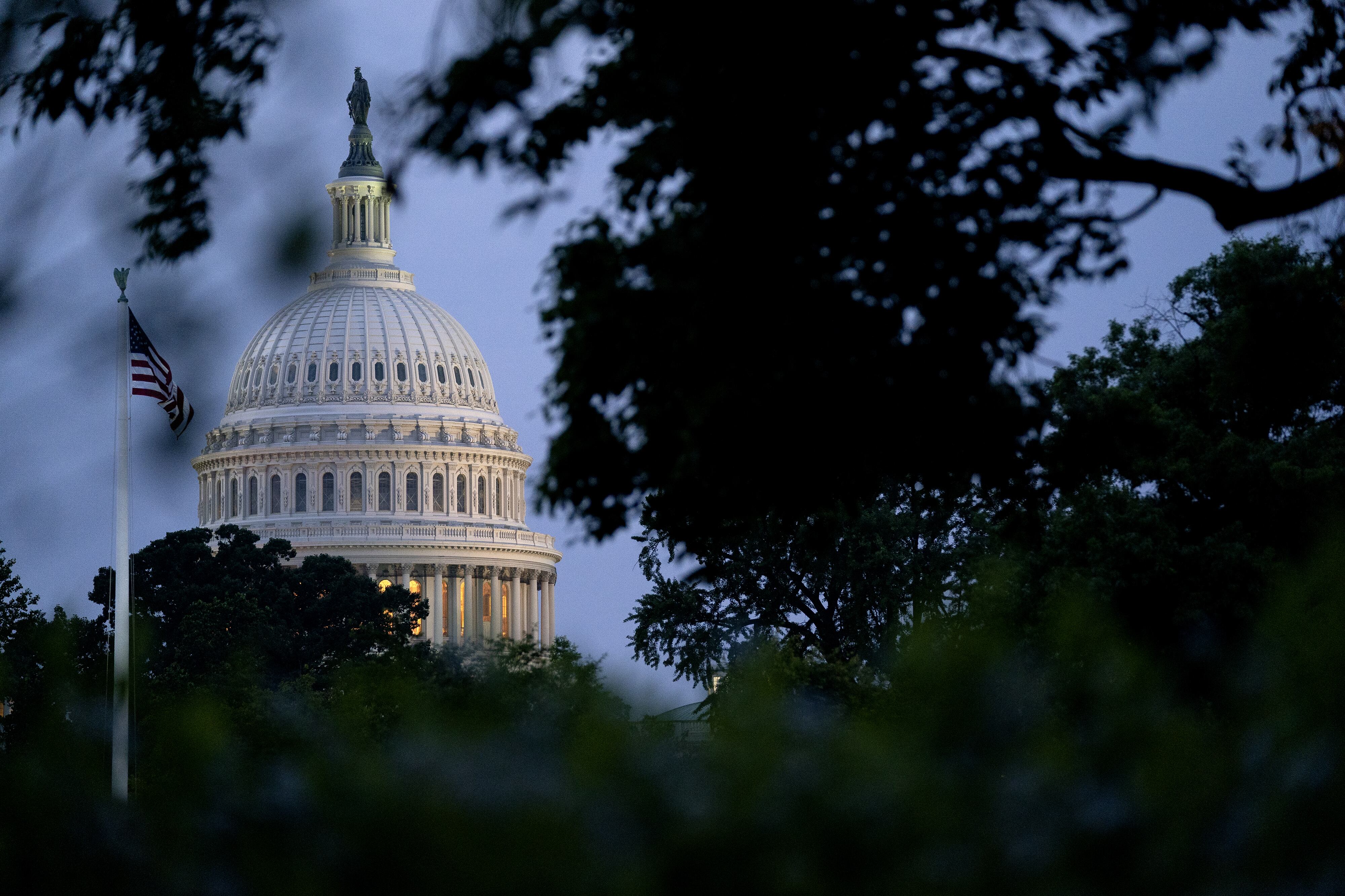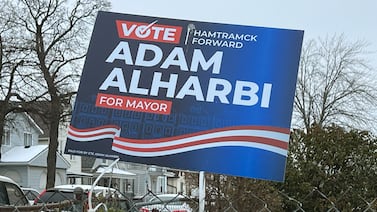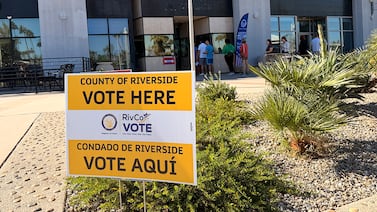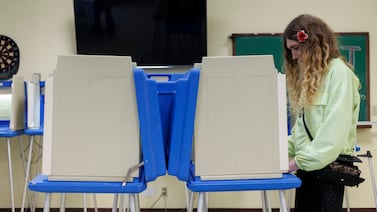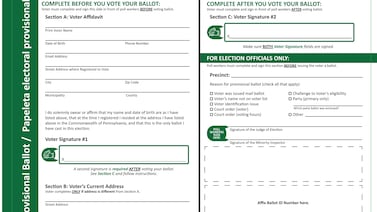Votebeat is a nonprofit news organization reporting on voting access and election administration across the U.S. A version of this post was originally distributed in Votebeat’s weekly newsletter.
During the midterm election, Luzerne County, in northeast Pennsylvania, ran out of ballot paper in dozens of precincts on Election Day. Months later, it’s still not clear why that happened, and a congressional hearing last Tuesday into the county didn’t find an answer to the question.
Democratic and Republican members of the U.S. House Administration Committee agreed the paper shortage represented a completely unacceptable breakdown — a total failure of election administration. But they spent much of the rest of the hearing, titled “Government Voter Suppression in Luzerne County, Pennsylvania,” debating whether the failures actually constituted “voter suppression.”
Luzerne County officials had no say either way — they didn’t show up for the hearing, citing an ongoing investigation into the matter.
The hearing shows that even when everyone agrees that voters have faced unacceptable obstacles, the partisan divide still looms large.
“I hope those officials who refused to testify today are watching, to hear from voters in Luzerne County whose votes were suppressed due to their negligence,” U.S. Rep. Bryan Steil (R-WI), the committee chair, said.
U.S. Rep. Joseph Morelle (D-NY), the ranking member, agreed the shortage was “a very, very bad thing,” but Morelle said the hearing’s title was meant to imply the county had engaged in a conspiracy to suppress votes.
“None of the testimony today provided, that I heard, supports the conclusory title of this hearing,” Morelle said. He went on to quote, accurately, from the Federal Bureau of Investigation’s website, which says voter suppression must include “intentionally deceiving” voters.
U.S. Rep. Barry Loudermilk (R-GA) countered with the definition of voter suppression from the Encyclopedia Britannica, which defines it as any “legal or extralegal measure or strategy whose purpose or practical effect is to reduce voting.”
What the hearing did not offer: New information about precisely how the paper shortages happened. Here’s what we know:
Starting as early as 9 a.m., some polling places began running out of ballot paper. By the end of the day, roughly one-third of precincts experienced a shortage. County officials placed emergency orders for tens of thousands of pieces of ballot paper on Election Day, suggesting they did not order it ahead of time.
It’s possible the shortages disenfranchised some voters, though how many is unclear. The committee played recorded testimony from Luzerne County voter Eugene Dougherty, among others, who said he delayed going to his polling place because of the shortage. When he showed up after 8 p.m., a poll worker told him the location was closed, despite a judge’s order that polling places remain open until 10 p.m. The problems came after a precipitous loss of experienced staff in the Luzerne County elections department.
The Board of Elections asked Luzerne County District Attorney Sam Sanguedolce to investigate the issue. Officials from Luzerne County, including deputy election director Beth Gilbert McBride, who oversaw the 2022 election, declined invitations to testify, citing the investigation.
Sanguedolce told the Associated Press following the hearing that he “wouldn’t narrow it to a criminal investigation,” and noted he has the authority to look into anything involving voter irregularity.
It’s unclear when his report will be released, though he told Votebeat several weeks ago that the “bulk of the legwork” was complete.
More hearings could be coming. For example, U.S. Rep. Morgan Griffith (R-Va) suggested subpoenaing officials who did not testify. “It’s going to take multiple hearings, it’s going to take a lot of investigation for us to get to the bottom of this, get the proper answers and ensure this never happens again,” Loudermilk said.
There was another clear sign this week that the Luzerne saga was far from over. State Rep. Seth Grove, a Republican, suggested at a Pennsylvania Department of State budget hearing Wednesday that perhaps the department should take over Luzerne’s election operation.
It would be an unprecedented move in Pennsylvania elections and require new legislation, but Grove’s suggestion shows how little patience lawmakers have left for Luzerne. The congressional hearing may not have produced solutions, but the need for them appears to be the only thing everyone agrees on.
Back Then
A bit of unappreciated Pennsylvania history: Thomas Young (1731-1777) was an organizer of the Boston Tea Party, a philosopher, a medical doctor and mentor to Ethan Allen. After receiving death threats in Boston he settled in Philadelphia and helped write the state’s constitution — which was, to that point, the most democratic of all of the state constitutions. In a letter to Allen written the year of his death, Young also suggested the name of the state of Vermont. It was a mashup of the French words “verd” (green) and “mont” (mountain), and honored the Green Mountain Boys — a militia group headed by Ethan Allen and named for the Green Mountains, which run up the side of the (now) state. The Green Mountain Boys, as well, took a broad view of who should be allowed to vote. When Vermont was admitted to the union, it became the most Democratic state (and, arguably, remains so).
New From Votebeat
From Votebeat Arizona: An Arizona veteran’s ballot rejection story went viral. Here’s what really happened.
From Votebeat Arizona: Maricopa County knew its voter signature review would be scrutinized. Here’s how it tried to improve before 2022.
From Votebeat Pennsylvania: Pennsylvania still doesn’t have uniform ballot curing policies after state appellate court ruling
From Votebeat Texas: Texas may be about to scrap a voting security system it can’t replace
In Other Voting News
- In one of the most muscular responses yet to local officials who declined to certify election results, North Carolina’s state elections board unanimously voted to remove two Surry County local officials who voted against certifying the 2022 election, saying they had violated state law, ABC News reported.
- After a nine-hour meeting, supervisors in Shasta County, California voted to hand-count all ballots going forward after ending a contract with Dominion Voting Systems based on conspiracy theories, SFGate reported. California’s attorney general has already warned the county it risked violating state and federal laws if it doesn’t use an approved electronic voting system. Shasta County Clerk and Registrar of Voters Cathy Darling Allen has warned hand-counting all ballots would cost more than 1.6 million and require hiring 1,300 staff members.
- Missouri Secretary of State Jay Ashcroft said he will not investigate Boone County Clerk Brianna Lennon, saying she did nothing illegal in joining the U.S. Alliance for Election Excellence and paying the group a $1,600 membership fee. Critics alleged the group, a nonpartisan collaborative that provides support to local election officials, was partisan, KRCG reported.
- Georgia lawmakers approved legislation that would further restrict counties’ ability to accept private money for election costs. After the Center for Tech and Civic Life gave $45 million to Georgia counties for the 2020 election, lawmakers prohibited direct contributions to county election officials, but allowed counties to continue to seek grants on their behalf. The new legislation, which requires approval from the governor, would eliminate that option, the Atlanta Journal-Constitution reported.
- A provider of online voting technology, Democracy Live, helped fund and guide research that pushed back on concerns about whether online voting is secure, CyberScoop reported.
- Worth your time: This fun read from the Washington Post about whether a voter fraud scheme contributed to the death of Edgar Allan Poe.
Carter Walker is a reporter for Votebeat in partnership with Spotlight PA. Contact Carter at cwalker@votebeat.org.

